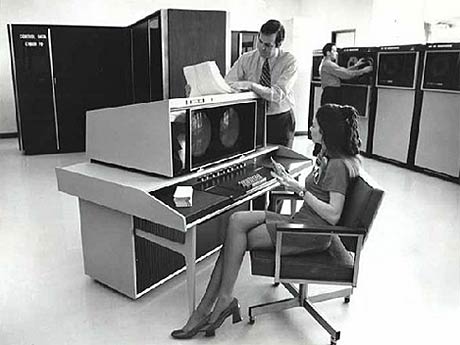Course:ETEC511/511HETAudio
ETEC 511 History of Educational Technology: Discourse Leadership:
Learning Module: Overview :: Audio - Paul & Petrina (2002) :: Reading #1 - Moody (1999) :: Reading #2 - Petrina (2004) :: Reading #3 - Petrina (2002) :: Wiki Activity :: Twitter BackChannel Discussion :: Conclusion
DLG Foundations: Learning Theory :: References
Created and Facilitated by: Rachel Bronk, Sharon Hann, Emily Jarvis, Aaron Mueller and Andrew Olson
Summary of The Magic Box
In order not to give away this resource I thought I would provide a brief outline of the various tools and also strategies throughout the decades as they are listed in the audio clip. I got very excited and nostalgic when listening to the clip about some of the tools I remember growing up with. I thought it might be kind of fun to have the discussion for this resource be based around what tools you were first exposed to and what this meant to you as a student and later as an educator or professional. Furthermore, one of the main strategies that the technology companies like Apple continued to hold was that once you were exposed to a certain computer you would continue to use that for life. I would be curious to know if this has held true for the majority of people in this course. I hope you enjoy some of the old memories. I know I did! Cheers, Andrew
1920s- Pressey's automatic teacher
- Intended to be an industrial revolution in education.
- Tended not to work for a variety of reasons
- 1930s saw cutbacks in spending and the automatic teacher abandoned
- Primarily used as a data collection device
1960s - Lyndon Johnson's Great Society promotes technology in education
- IBM and other private businesses seek money from the government by trying out new inventions in schools
- Computers primarily consist of pre-punched cards
- Computers mainly used by schools for attendance data collection purposes as schools were funded by attendance
- Software such as Course Writer is tried by the late 1960s.
File:
1970s - Steve Wozniak and Liza Loop begin to bring computers to the masses
- 1972-1975 The Loop Centre is created to allow public access for children to computers
- Steve Jobs joins Steve Wozniak in creating the Apple I (1976) and Apple II (1977) designed as a "kids first" approach to the market
- Apple works on the premonition that people will stick with the first computer that they are exposed to for the rest of their lives
File:
1980s - Apple and PC compete for the educational market in different ways.
File:
- 1984 the Macintosh personal computer is released with programs such as MacPaint and MacWrite
- Apple/Macintosh flood the school system with materials to try and convince teachers of the value of the computer
- PC (mainly IBM) continue to deal with the school system as another business client and try to sell to the superintendents and others in charge
- Late 1980s Macintosh dominates the educational field with its easy to use windows system and mouse.
- Jim Dalzell (sp?) gets IBM and PC back into the ballgame with the introduction of reading software called "Writing to Read"
- Other forms of PC such as Tandy, Atari and Commodore compete with IBM in the PC market
File:
1990s and 2000s - PC begins to win the educational market with the introduction of the Windows 95 operating system
- The Internet changes computer usage, mass communication and how computers are used in schools
- Currently Apple is a distant second in terms of usage in educational systems
- IBM is now the 4th ranked PC in terms of sales
Discussion Questions
Please address these questions by responding to the appropriate thread in Vista discussions
1. Which of the above stages were you first exposed to as a student or later as a professional? Did this change how you operated? In what ways?
2. Did Apple's idea in the 1970s hold true for you? Have you continued to be loyal to the first computer you were exposed to? If not, why do you think this is?
3. Due to the popularity of this topic in the discussion I thought it would be appropriate to add this third question in to deal with it: 1) What was the most valuable piece of educational software you have used? 2) What was the best game you ever played?